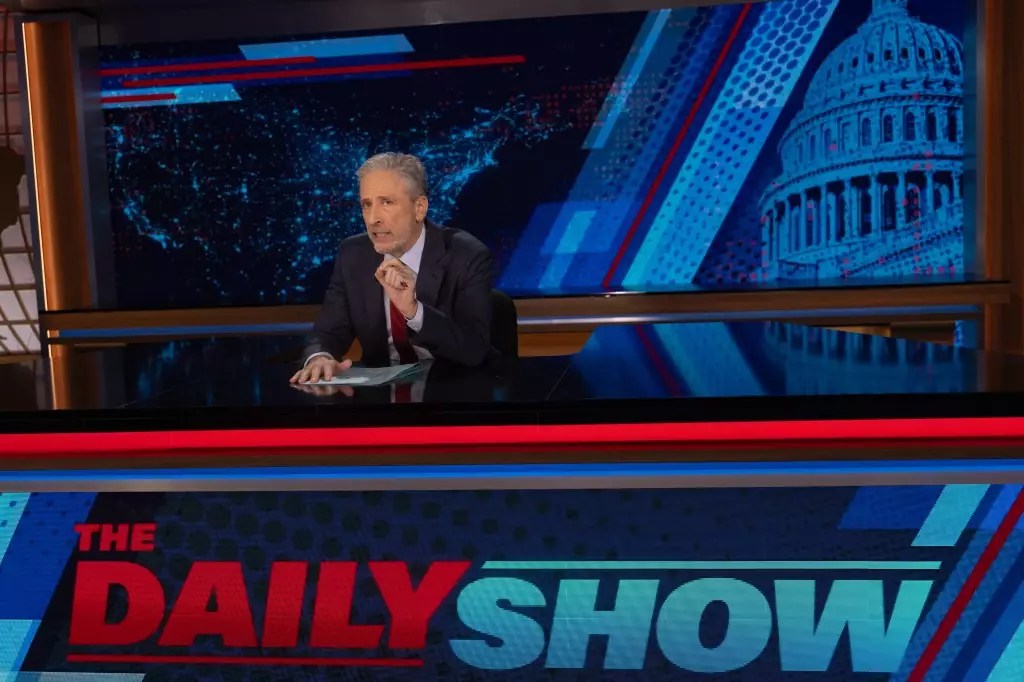In a world brimming with political uncertainty, Jon Stewart’s return to The Daily Show feels like a much-needed reprieve. As he takes center stage, there’s an unmistakable air of apprehension hovering over the audience, particularly among Democrats who have watched the political landscape shift in unpredictable ways. Stewart’s opening remarks, laced with humor, acknowledge this nervous energy but twist it into a boon for ratings. “I want to assure you that that is very good for our ratings, so keep it up,” he quips, transforming collective anxiety into comic gold. This moment encapsulates the duality of political engagement: the anxiety it breeds in viewers as well as the entertainment potential for comedy.
The segments featuring Troy Iwata, Grace Kuhlenschmidt, and Jordan Klepper serve as a commentary not only on the political climate but also on the absurdity that often characterizes it. Iwata’s choice of attire, dressed provocatively as a “garbage outfit,” symbolizes the frustration many feel towards politics today. His assertion that people are “really sick of all the positive signs” brilliantly highlights a public yearning for clarity and decisive outcomes rather than optimistic forecasts. Stewart’s interactions with Iwata further emphasize the limits of optimism against a backdrop of palpable unease.
Instead of merely addressing issues head-on, Stewart’s skill lies in exposing the absurdity within them. The laughter this generates allows a moment of respite for viewers who might otherwise be overwhelmed by the gravity of the situation. By juxtaposing whimsical comedy with the serious matters of political unrest, Stewart crafts a space where audiences can process their feelings while being entertained, showcasing the power of humor as both a coping mechanism and a form of resilience.
The abrupt cancellation of Senator John Fetterman’s scheduled appearance adds another layer of intrigue to the episode. When Arizona Governor Katie Hobbs steps in, she brings with her a pragmatic sense of optimism, juxtaposed against the more chaotic elements of Stewart’s humor. Her announcement that she believes in positive results contrasts with the panicking sentiment echoing throughout the country. Stewart doesn’t miss the opportunity to blend humor with this tense moment, whimsically declaring Hobbs the victor in a light-hearted contest against Fetterman, illustrating how he navigates the seriousness of political stakes while keeping the atmosphere light.
Stewart’s brilliance lies in his understanding of the role that comedy plays in political discourse. By addressing the audience’s worries while simultaneously providing a comedic framework, he effectively transforms anxiety into engagement. His approach fosters a unique environment where political commentary does not simply provoke fear but encourages dialogue and reflection. Comedy becomes a conduit for discussing pressing issues, creating a stark yet necessary contrast to traditional forms of media that often fall prey to sensationalism and negativity.
Jon Stewart’s transformative influence on The Daily Show underscores the importance of humor in times of uncertainty. By highlighting the absurdities within the political realm while engaging with the current anxieties of his audience, Stewart not only entertains but also cultivates an informed citizenry that is ready to engage with the complexities of contemporary politics. As viewers laugh through their worries, they remain connected and aware, ready to navigate the evolving political landscape together.


Leave a Reply